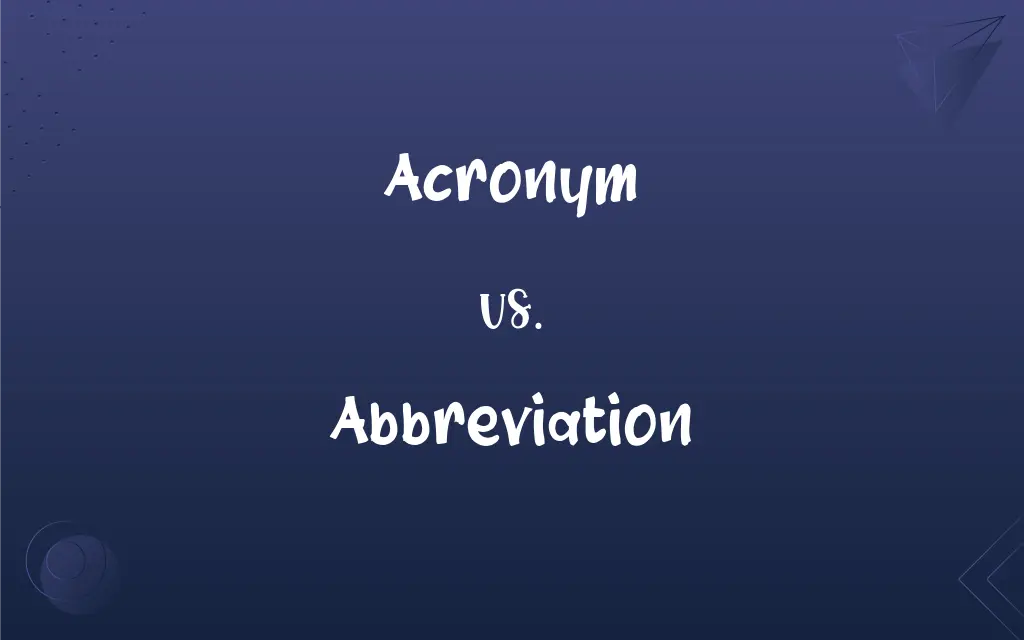Acronym vs. Abbreviation: What's the Difference?
Edited by Aimie Carlson || By Harlon Moss || Updated on October 23, 2023
An acronym is formed from the initial letters of words and pronounced as one word, while an abbreviation is a shortened form of a single word or phrase.

Key Differences
An "acronym" is a specific type of abbreviation where the initial letters of a phrase or name are combined to create a word that can be spoken. For instance, NASA stands for "National Aeronautics and Space Administration," but "NASA" itself is pronounced as a single word.
On the other hand, an "abbreviation" is a broader term that represents any shortened form of a word or group of words. Abbreviations can encompass more than just acronyms. For instance, "Dr." is an abbreviation for "Doctor," but it is not an acronym as it doesn't form a pronounceable word.
While both acronyms and abbreviations serve the purpose of simplifying long terms or phrases, their constructions differ. An acronym like "laser" stands for "Light Amplification by Stimulated Emission of Radiation," making "laser" a word on its own. Yet, "Ave." as an abbreviation for "Avenue" doesn't produce a new word.
It's worth noting that all acronyms are abbreviations, but not all abbreviations are acronyms. An abbreviation might just be a few letters representing a word, while an acronym forms a new word from initial letters.
Understanding the distinction between acronyms and abbreviations can enhance clarity in communication. Recognizing when to use "UN" as an abbreviation for "United Nations" versus "NATO" as an acronym for "North Atlantic Treaty Organization" aids precise expression.
ADVERTISEMENT
Comparison Chart
Definition
A word formed from initial letters and pronounced as one.
A shortened form of a word or phrase.
Pronunciation
Pronounced as a single word.
Might not be pronounced as a word.
Examples
NASA, NATO, laser
Dr., Ave., UN, etc.
Scope
A subset of abbreviations.
A broader category including acronyms.
Origin
Derived from the first letters of words in a phrase.
Can be derived from any part of a word or phrase.
ADVERTISEMENT
Acronym and Abbreviation Definitions
Acronym
An abbreviation pronounced as a single word.
NATO is an acronym representing North Atlantic Treaty Organization.
Abbreviation
A reduced version of a word, retaining its primary meaning.
Prof. is an abbreviation for Professor.
Acronym
A term formed by combining letters from a phrase to make a new word.
Laser is an acronym derived from Light Amplification by Stimulated Emission of Radiation.
Abbreviation
A concise form of a word or phrase, often denoted with periods.
U.S.A. is an abbreviation for United States of America.
Acronym
A word composed of the initial letters of a name or phrase.
AIDS is an acronym for Acquired Immune Deficiency Syndrome.
Abbreviation
A shortened form of a word or group of words.
Dr. is an abbreviation for Doctor.
Acronym
A condensed representation of a phrase where the result is spoken as a word.
PIN is an acronym for Personal Identification Number.
Abbreviation
A condensed representation of a term, not necessarily forming a new word.
Ave. is an abbreviation for Avenue.
Acronym
A specific type of abbreviation formed from initial letters and producing a distinct word.
SCUBA stands for Self-Contained Underwater Breathing Apparatus and is an acronym.
Abbreviation
A term that's shortened for brevity or ease of use.
Etc. is an abbreviation for et cetera.
Acronym
A word formed by combining the initial letters of a multipart name, such as NATO from North Atlantic Treaty Organization or by combining the initial letters or parts of a series of words, such as radar from radio detecting and ranging.
Abbreviation
The act or product of shortening.
FAQs
Are all acronyms abbreviations?
Yes, all acronyms are a subset of abbreviations.
Can any abbreviation be an acronym?
No, only those abbreviations that form a pronounceable word are acronyms.
Why are abbreviations used?
Abbreviations simplify long terms or phrases, making them easier to read or write.
Are abbreviations informal?
Some abbreviations are informal, but many, like "Dr." for "Doctor," are widely accepted.
How do I know if something is an acronym?
If it's formed from initial letters and pronounced as a single word, it's an acronym.
How did acronyms originate?
Acronyms arose for convenience, especially in sectors like the military, where brevity is crucial.
Can an acronym evolve into a standard word?
Yes, like "laser" began as an acronym but is now a standard word.
Are abbreviations universal across languages?
While the concept exists universally, specific abbreviations may vary by language.
Do abbreviations always need periods?
In American English, many abbreviations use periods, but it's not a strict rule.
Is "Mr." an acronym?
No, "Mr." is an abbreviation for "Mister."
What's the main difference between an acronym and abbreviation?
An acronym is pronounced as a word formed from initial letters, while an abbreviation is a shortened form of a word or phrase.
Is "USA" an acronym or abbreviation?
"USA" is an abbreviation for "United States of America," not typically pronounced as a word.
What's an example of a common abbreviation?
"Apt." for "Apartment" is a common abbreviation.
Can an abbreviation have numbers?
Yes, like "24/7" is an abbreviation for "24 hours a day, 7 days a week."
Why are acronyms useful?
Acronyms simplify lengthy phrases, making them concise and easier to recall.
Is "LOL" an acronym or abbreviation?
"LOL" is an acronym for "laugh out loud."
What's an example of a long abbreviation?
"i.e." is an abbreviation for the Latin "id est," meaning "that is."
Do acronyms always stand for positive phrases?
No, acronyms can represent any phrase, regardless of its positive or negative connotation.
Should I always explain what an acronym stands for?
It's best to define an acronym upon its first use, especially if it might be unfamiliar to the audience.
How are acronyms different from initialisms?
Acronyms form pronounceable words, while initialisms, like "FBI," are pronounced letter by letter.
About Author
Written by
Harlon MossHarlon is a seasoned quality moderator and accomplished content writer for Difference Wiki. An alumnus of the prestigious University of California, he earned his degree in Computer Science. Leveraging his academic background, Harlon brings a meticulous and informed perspective to his work, ensuring content accuracy and excellence.
Edited by
Aimie CarlsonAimie Carlson, holding a master's degree in English literature, is a fervent English language enthusiast. She lends her writing talents to Difference Wiki, a prominent website that specializes in comparisons, offering readers insightful analyses that both captivate and inform.
































































